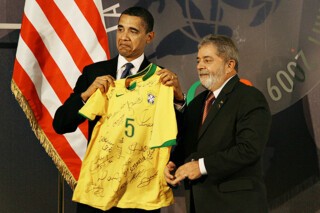Obstacles to Progress
Greg Grandin · The Latin America Lobby
The honeymoon between Barack Obama and Luiz Inácio Lula da Silva didn’t last long. When Obama was elected, the US press imagined a natural alliance between the two men, expecting them to sideline the ideologues and set the Western Hemisphere back in greased grooves. ‘This is my man, right here,’ Obama said at the G20 summit in London in April, grinning and shaking Lula’s hand. ‘I love this guy.’
The first bump in the road was the coup in Honduras in June, which sparked a clash of wills between the US and Brazil over how best to settle it. ‘Our concern,’ said Lula’s foreign-policy adviser, Marco Aurélio Garcia, is that Washington’s push to legitimise the Honduran elections ‘will introduce the “theory of the preventive coup”’ – an extension of Bush’s doctrine of preventive war – ‘in Latin America’.
Then the Obama administration let it be known it was going forward with plans to lease seven military bases in Colombia.
Next came Washington’s decision to pick a fight with Brazil over a visit by the Iranian president, Mahmoud Ahmadinejad, with Obama sending a letter to Lula reminding him of his international obligations. The tone of the letter must have annoyed someone high up in Lula’s foreign-policy team, who leaked it to the press. This further irritated the US.
Finally there was Copenhagen. Lula showed up at the climate conference with an ambitious pledge to reduce Brazil’s carbon output by 40 per cent before 2020 and to slow deforestation of the Amazon by 80 per cent. After the conference ended with a tepid statement and no fixed plan to move forward, Brazil strongly criticised Obama’s leadership. ‘Do something, Obama,’ said Carlos Minc, Lula’s environmental minister, ‘or return the Nobel Prize.’
Insiders report that top officials in the State Department are furious with what they see as Brazil’s third-world grandstanding. They would do better to focus their ire at domestic targets, for the real obstacles to progress in US-Latin American relations are not to be found in Caracas, Managua or Brasilia, but much closer to home.
Obama could have used the Honduran crisis to showcase his ‘new multilateralism’, working with Brazil to restore democracy. But the legislative Republican right, led by two first-term senators, South Carolina’s Jim DeMint and Florida’s George LeMieux, pushed the other way. The White House caved.
The president could have scaled back plans for US military expansion in Colombia. But that would have meant rethinking a failed, decades’ long, multi-billion dollar, bipartisan War on Drugs – from which the Pentagon, influential US private security firms like DynCorp and blue-state based defence contractors like Connecticut’s United Technologies all profit – and Obama has other wars to extricate himself from.
He could have made some concessions to Brazil’s agricultural sector, promising to reduce tariffs and subsidies. But another senator, Charles Grassley, representing the corn state of Iowa – and the interests of Monsanto – put a hold on Thomas Shannon’s confirmation as ambassador to Brazil until the White House pledged not to.
The White House could move quicker to normalise relations with Cuba, as Brazil, along with the rest of Latin America, has long demanded. But that would mean taking on the Cuba lobby. After Grassley dropped his hold, LeMieux froze Shannon’s nomination until he was sure there would be no Cuba opening. The ability of unimpressive politicians to paralyse US foreign relations is summarised in the fitful progress of Shannon’s nomination: in between Grassley and LeMieux, DeMint stopped the confirmation until Obama turned on Honduras.
Obama could also try to come up with a new vision for a hemisphere-wide post-crisis political economy, one that abandons failed neoliberal prescriptions and tries to balance Latin American calls for sustainability, equity and development with the demands of corporate balance sheets. But the Democratic Party is the Wall Street party. Obama has long since abandoned his pledge to renegotiate Nafta, and there are indications that he will soon endorse the stalled free-trade agreement with Colombia – objectionable not only because of the country’s high body count but because the treaty would grant foreign corporations the right to overturn national environmental laws and would require the liberalisation of Colombia’s financial sector, including the deregulation of disruptive ‘hot money’ speculation.
Lula, no less than Obama, operates within constraints. Brazil has powerful agricultural, financial, and industrial sectors and a large, interest-aware military. But like most of the rest of South America, it also has a vibrant, influential left that holds politicians accountable. In the presidential elections later this year, Lula’s Worker’s Party is being challenged from the left by Lula’s former environment minister, Marina Silva – one reason for his strong stance in Copenhagen.
The US, in contrast, is still very much in thrall to a vibrant, powerful right. And that leaves Obama little more to offer Latin America than military bases, coups and the empty rhetoric of free trade.
